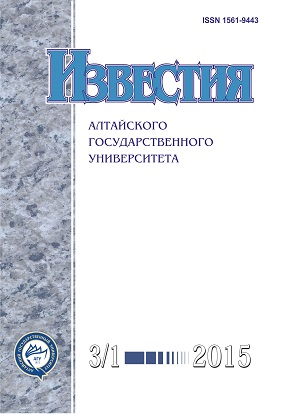Methodological Recommendations on the Use of the Educational Blog in the Teaching Process
DOI:
https://doi.org/10.14258/izvasu(2015)3.1-03Keywords:
educational blog, methodological recommendations, vocational training educator, discussion, educational process, electronic educational environmentAbstract
The article describes methodological recommendations on the use of educational blog in the teaching students (on the example of the formation of a communication element of ICT-expertise of would to be educators on vocational training). The author suggests different electronic educational resources to form such expertise. Thus, one can use video lectures, visualization lectures, multimedia lectures, and electronic presentations. Students get and develop theoretical practice in class via interactive process when they discuss source material, different problems, solve tasks, practice, learn intersubject communications. Such practice is organized through person to person interaction that using educational blogs not only provides students with social and professional knowledge, but also develops personal qualities necessary for the professional field. The author characterizes training procedure at the three stages: preliminary, operational, reflexive and evaluating, showing didactic opportunities of educational blogs. Estimation criteria of students’ proficiency to participate in discussion on educational blog are offered. Educational blogs are regarded as an efficient training device to make a student change the position of a passive information consumer toward an active and conscious participant of the educational process.
DOI 10.14258/izvasu(2015)3.1-03
Downloads
References
Лаврентьев Г.В. Дистанционное обучение: теоретико-методологические основы // Вестник Алтайской академии экономики и права. - 2012. - №2.
2
Лаврентьев Г.В., Лаврентьева Н.Б., Неудахина Н.А., Новоселова Л.А. Профессиональное становление студентов инженерно-педагогической специальности: активизация и психолого-педагогическое сопровождение : монография. - Барнаул, 2005.
3
Стародубцев В.А., Киселева А.А. Блог как средство электронного обучения // Высшее образование в России. - 2014. - №7.
4
Филатова Н.И. Инновационные формы организации самостоятельной работы студентов [Электронный ресурс] - URL: http://www.pglu.ru/lib/publications/Universi-ty_Reading/2010/V/uch_2010_V_00040.pdf.
5
Белов С.А., Лазарева Д.Г Обучение студентов вуза с использованием блогов как средства управления их учебно-познавательной деятельностью // Известия Алт. гос. унта. - 2011. - №2/2.
6
Белов С.А. Использование блогов в образовательном процессе высшей школы // Ползуновский альманах. - 2011. - №1.
7
Филатова А.В. Оптимизация преподавания иностранных языков посредством блог-технологий (для студентов языковых специальностей вузов) : дис.. канд. пед. наук. - М., 2009.
8
Баркалов А.А., Белов С.А., Лаврентьева Н.Б. Разработка блога по дисциплине «Общая и профессиональная педагогика» для студентов направления подготовки «Профессиональное обучение (по отраслям)» // Горизонты образования : труды IX Всерос. науч.-техн. конф. студентов, аспирантов и молодых ученых «Наука и молодежь-2012» (Барнаул, 2012). [Электронный ресурс]. - URL: http://edu.secna.ru/media/f/profo-br_.pdf.
9
Кузеванова О.М., Лаврентьев Г.В., Лаврентьева Н.Б. Общая и профессиональная педагогика : сборник практических и самостоятельных работ. - Барнаул, 2009.
10
Кузеванова О.М., Лаврентьев Г.В., Лаврентьева Н.Б. Использование учебно-методического комплекса в процессе формирования профессионально-педагогической компетентности мастеров профессионального обучения : монография. - Барнаул, 2009.
11
Лаврентьев Г.В., Лаврентьева Н.Б. Педагогическая компетентность преподавателя как условие внедрения образовательных инноваций // Вестник алтайской науки. - 2000. - №1.
12
Нечаева А.В., Лаврентьев Г.В. Формирование интегративной культуры будущих специалистов в процессе обучения студентов инженерно-экономического факультета // Инженерное образование. - 2007. - №4.
Downloads
Issue
Section
License
Izvestiya of Altai State University is a golden publisher, as we allow self-archiving, but most importantly we are fully transparent about your rights.
Authors may present and discuss their findings ahead of publication: at biological or scientific conferences, on preprint servers, in public databases, and in blogs, wikis, tweets, and other informal communication channels.
Izvestiya of Altai State University allows authors to deposit manuscripts (currently under review or those for intended submission to Izvestiya of Altai State University) in non-commercial, pre-print servers such as ArXiv.
Authors who publish with this journal agree to the following terms:
- Authors retain copyright and grant the journal right of first publication with the work simultaneously licensed under a Creative Commons Attribution License (CC BY 4.0) that allows others to share the work with an acknowledgement of the work's authorship and initial publication in this journal.
- Authors are able to enter into separate, additional contractual arrangements for the non-exclusive distribution of the journal's published version of the work (e.g., post it to an institutional repository or publish it in a book), with an acknowledgement of its initial publication in this journal.
- Authors are permitted and encouraged to post their work online (e.g., in institutional repositories or on their website) prior to and during the submission process, as it can lead to productive exchanges, as well as earlier and greater citation of published work (See The Effect of Open Access).








